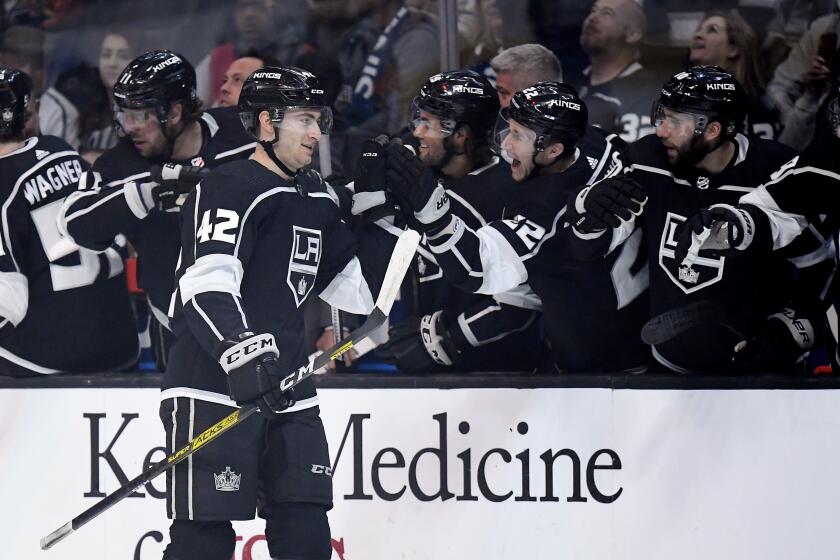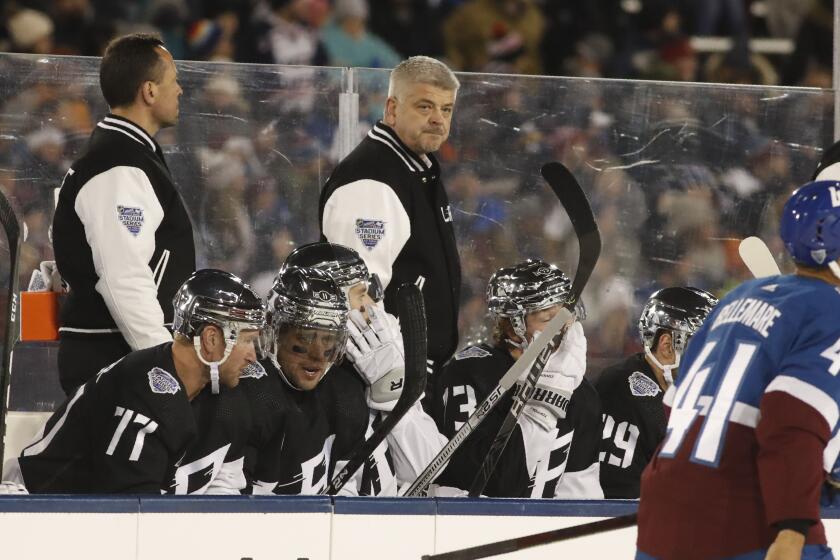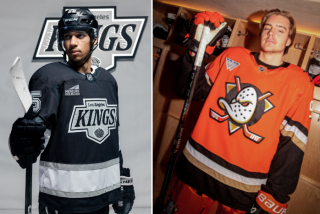Kings’ choice for helmet logo creates ‘goosebumps’
- Share via
When the idea first came across Luc Robitaille’s desk, the Kings president recognized it as an immediate no-brainer.
After the NHL announced last month that clubs could place advertisement logos on their helmets for the 2020-21 season, his organization had found a partner worth much more than just another revenue stream.
Beginning with their season opener Thursday night, the Kings’ home and away helmets this season will feature the logo of the California HOPE Crisis Counseling Program, a mental health and wellness initiative funded by the Federal Emergency Management Agency and run by the California Department of Health Care Services.
“It’s easy to put on a brand,” Robitaille said. “But for us to have something that can actually make a difference, it can really help us spread the message, that was when it really perked my attention. I was really happy.”
The partnership includes several other elements beyond the 2.25-inch-by-3.75-inch helmet logo, the first time in franchise history a partner brand will appear on any of the Kings’ official game equipment. But for a state-sponsored program whose crisis-support services have never been more widely needed, the uniform recognition will be “priceless,” according to Dr. Jim Kooler, the assistant deputy director of behavioral health at DHCS.
“I get goosebumps thinking about that,” he said.

California HOPE has been around for years, but only during the last half decade became a prominent program under the DHCS umbrella. Before the coronavirus pandemic, its main focus was providing support to California areas impacted by such natural disasters as earthquakes and wildfires.
But once COVID-19 began wreaking havoc in the state last spring, the program rededicated its resources to aiding the public at large through services like online self-help tools, mindfulness apps, a stress-relief telephone hotline, individual counseling, and school programs to support teachers and students.
“The stressors in our society right now are just overwhelming,” Kooler said. “Cal HOPE is able to assist people with the general stress of what they’re feeling.”
To do that, however, the program needed to raise its profile. In Northern California, it teamed with the San Francisco 49ers to deploy resources throughout the area. In Southern California, the partnership with the Kings “takes it up a notch,” Kooler said, helping the program “reach a sports market that we normally couldn’t reach ourselves.”
When the Kings and California HOPE began discussing an affiliation earlier in the fall, Kooler said his group casually mentioned the idea of uniform advertising, never actually expecting it could happen. Weeks later, the NHL’s helmet-ad decision suddenly made it a possibility.
The Kings announced their active roster ahead of Thursday’s opener against the Minnesota Wild, with several players listed on the COVID Protocol Related Absences list.
“The timing of it all between talking with them was just right,” said Josh Veilleux, senior vice president of AEG Global Partnerships, the marketing division for such AEG-owned teams as the Kings. “It made the decision easy for us.”
League-wide, the idea of helmet ads was met with a mixed response from pundits and fans. Though it gave clubs an opportunity to recoup some of the revenue lost to the pandemic, it also made de facto billboards out of a traditional piece of teams’ uniforms.
Other NHL franchises have struck agreements with banks, tech companies, private healthcare providers and other commercial entities. Kings officials said they purposely pursued something unique.
“We didn’t go into it with a dollar-signs-only mentality,” Veilleux said. “We wanted to try to use this as more than just a billboard, but as an opportunity to get a message out.”
There is a financial component to California HOPE’s arrangement with the Kings of about $500,000, according to Kooler. But that covers “a whole range of things” that the program and team will work on together, he said, from additional in-arena advertising to public service announcements on the team’s social media feeds.
Veilleux said it was possible, but by no means certain, that the Kings could have struck a more lucrative deal with someone else. Other big-market NHL teams were reportedly eyeing potential seven-figure returns for helmet sponsorships alone.
“But having buy-in from the top down saying it’s the right partner, it’s the right message, it’s the right story to tell this year — it didn’t take long for everybody to get on board,” Veilleux said.
Added Kooler: “Instead of just slapping another logo on that generates income, this is going to generate the saving of lives.”
Kings season preview: They hope their rebuild is complete and they can compete for a postseason spot in 2021 instead of worrying about more roster change.
For now, the league has only committed to allowing helmet ads for this season in an effort to compensate for a shortened 56-game schedule that most teams will play in empty arenas. But to Kooler, that could be more than enough time to give California HOPE the exposure it needs.
“The message being delivered by the Kings to the Southern California audience is powerful in a way that we couldn’t have achieved on our own,” Kooler said. “So many times we put up programs that don’t get used. This will not be the case with the Kings.”
More to Read
Go beyond the scoreboard
Get the latest on L.A.'s teams in the daily Sports Report newsletter.
You may occasionally receive promotional content from the Los Angeles Times.









